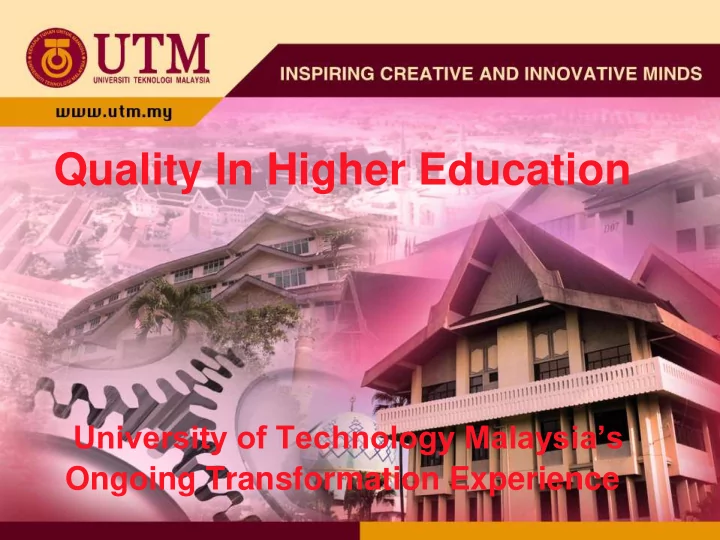

Quality In Higher Education University of Technology Malaysia’s Ongoing Transformation Experience
ELEMENS OF CONTROL IN UNIVERSITY GOVERNANCE Curriculum Qualified KPI Stakeholder -MQA assessment Student Lecturer Survey -Review Intake qualification UTM’s Vision, UTM Transformation Mission and Goals University ranking Structure Culture Conducive Infrastructure Before During After
UTM Organizational structure Vice Chancellor Deputy Vice Deputy Vice Deputy Vice S Chancellor Chancellor Chancellor (Academic and (Research and (Student Affairs E International) Innovation and ALUMNI N A Research Deans Student Activities , T Alliances Accommodation E (Executive Director) Heads of Department Academic Post- Center of Quality Quality Graduate Teaching Unit Committees School & Learning
Malaysian Qualifications Agency (MQA)
Transformation from traditional teaching to teaching and learning with emphasis on learning rather than teaching This transformation brought about the concept of outcome-based education Other changes : student-centred learning problem-based learning
COURSE PROGRAM PROGRAM VISION & OUTCOME EDUCATION OUTCOME MISSION OUTCOME COURSE (1) Apply math employable OUTCOME graduates (3) Design system leadership skill Able to determine force (7) Communicate effectively Able to establish …. creative & innovative (10) Life-long learning Able to design …. holistic graduates Able to develop …. (13) Lead project research and lifelong learning (15) Knowledge in business ASSESSMENT - Exam ASSESSMENT ASSESSMENT - Test - Survey - Assignment After 5 years of - Interview - Project graduation - FYP - Presentation
Why the emphasis on quality higher education? and how quality in higher education is ascertained and maintained? On 1-11 -2007, a new agency Malaysian Qualifications Agency (MQA) was established under a new education legislation the Malaysian Qualifications Act 2007 This government agency is wholly responsible for the quality in higher education for all institutions offering higher education to the people. The MQA prepares quality procedures, accredits programs, monitors quality and facilitates matters related to higher education Every educational institute offering any higher education program must comply with MQA standards ,otherwise its degrees will not be recognized MQA accredited are recognized globally
The MQA has produced a code for higher education The code provides a guideline of general requirements in the following areas: Vision, mission and learning outcomes; Curriculum design and delivery; Student selection and support services; Assessment of students; Academic staff; Educational resources; Programme monitoring and review; Leadership, governance and administration; and Continual quality improvement
Malaysian Qualifications Framework UTM has adopted the Malaysian Qualifications Framework The Malaysian Qualifications Framework (MQF) is Malaysia’s declaration about its qualifications and their quality in relation to its education system. MQF is an instrument that develops and classifies qualifications based on a set of criteria that are approved nationally and benchmarked against international best practices, and which clarifies the earned academic levels, learning outcomes of study areas and credit system based on student academic load. These criteria are accepted and used for all qualifications awarded by recognised higher education providers. Hence, MQF integrates with and links all national qualifications. MQF also provides educational pathways through which it links qualifications systematically. These pathways will enable the individual to progress through credit transfers and accreditation of prior experiential learning, in the context of lifelong learning.
Eight Levels of MQF Qualifications The MQF has eight levels of qualifications in three national higher education sectors and is supported by lifelong education pathways. The sectors are (a) Skills; (b) Vocational and Technical; and (c) Academic. Levels 1 to 3 are Skills Certificates awarded by the Skills Sectors. Academic and Vocational and Technical Certificates are at Level 3. Meanwhile, Diploma and Advanced Diploma are at Levels 4 and 5. Bachelors Degree is at Level 6, Masters Degree at Level 7 and Doctoral Degree at Level 8. The levels are differentiated by learning outcomes, credit hours and student learning time. Lifelong education pathways cut across all levels of qualifications through accreditation of prior experiential learning
"Outcome-Based" Education: Briefly it is because there have been concerns that the education system cannot adequately prepare students for life and work in the 21st Century . This has prompted people to explore new ways of designing education. In several countries in the West, educators and policy makers are attempting to change the way we measure the effectiveness of education from an emphasis on traditional inputs, such as course credits earned and hours spent in class, to results or outcomes. The emphasis is on outcomes – what the student will be able to do at the end of the course
For problem-based learning - The Motivation to Learn Begins with a Problem In a problem-based learning (PBL) model, students engage complex, challenging problems and collaboratively work toward their resolution. PBL is about students connecting disciplinary knowledge to real- world problems — the motivation to solve a problem becomes the motivation to learn .
The Learning Outcomes Student achievements are measured by learning outcomes. These learning outcomes distinguish the varying competencies as to what a student will be able to do at the end of a period of study. Learning outcomes are based on eight domains: Knowledge; Practical skill; Social skills and responsibilities; Values, attitudes and professionalism; Communication, leadership and team skills; Problem solving and scientific skill; Information management and lifelong learning skill; and
Students were said to be also lacking in generic skills , so a set of generic skills were also included in the quality evaluation of a program Domains of generic (soft) skills Critical thinking Team working Communications skills Entrepreneurship Values Leadership And for each of these the teacher must design evaluation that can measure the level of skills the student has attained
The learning outcomes must involve three aspects: The cognitive – thinking skills, pure knowledge The affective – emotion, feelings The psycho-motor – physical aspect, how one does things with the hands
Conclusion With OBE (outcome-based education), a quality assurance system has been developed in Malaysia and UTM has adopted this system for all its programs This also allows for recognition and accreditation not only in Malaysia but also globally. The MQA is the quality assurance agency for higher education in Malaysia
Thanks you
Recommend
More recommend